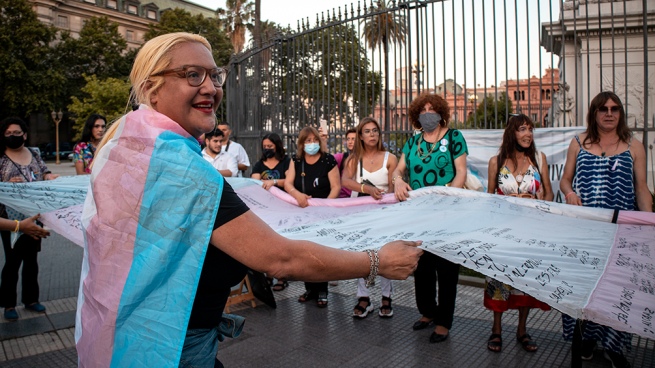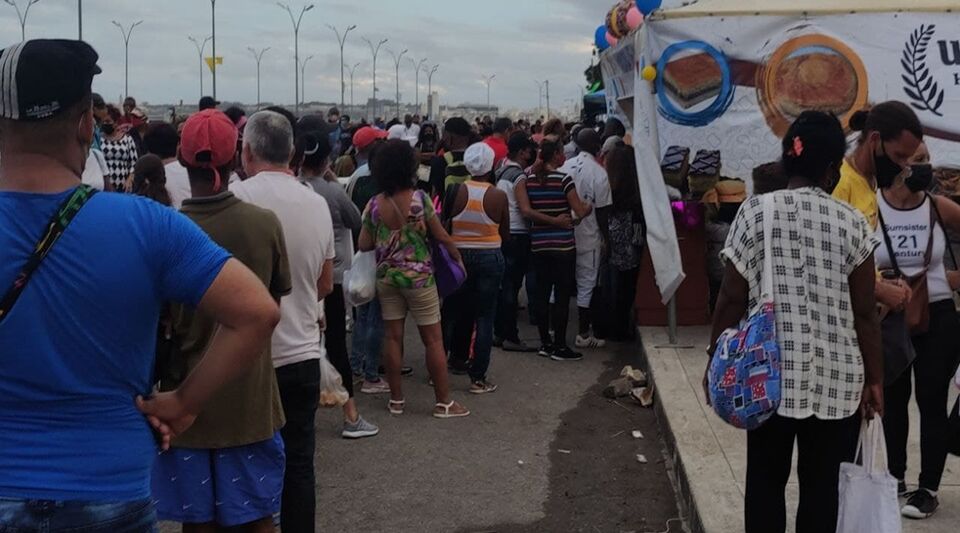María Belén Correa relived the anecdote giving free rein to her emotion: last night, during the banner that traveled the distance between Plaza de Mayo and the National Congress, a trans boy from La Rioja approached her to greet her and exchange words. he asked his mother as a birthday present to come together to Buenos Aires and participate in the “candlelight action” to commemorate the International Day of Trans Memory.
“I was moved by the encounter with that boy. The social conditions of today’s childhoods are far from what we had during our childhoods. Today’s boys and girls are most likely not thrown into the open by their families and school.” , he recalled before Télam Correa.
Historical activist -together with Nadia Echazú, Lohana Berkins and Marlene Wayar-, and founder of the Trans Memory Archive, whose collection reaches 10,000 images about the daily life of transvestite and trans people in the 1940s and 1990s, Correa noted that yesterday’s banner sought to “display politically and with the forcefulness of silence” the names of the “900 people killed as a result of state violence.”
The flag for Trans Memory collected 300 new names of victims – Correa indicated to Télam- during the tour he made during the last four months through different parts of the country, all of them joined the inscriptions that already had the blue, pink and white banner of 15 meters long and 7.5 wide that last night received the lighting of the 150 candles that the organizers gave to the militants and other people who participated in the commemoration.
“We and we also need memory, truth and justice,” warned Correa, for whom “democracy has a historical debt” with transvestite, transsexual and transgender people.
Yesterday was the sixth annual action in which this group rescues and vindicates the memory of its members. “Only this time we left the squares in which we commemorated the previous years – they were those of Carlos Jaúregui and Roberto Arlt – and we went to the street, coinciding with the federal Banderazo.”
Correa estimated the number of participants for yesterday’s session at 200. “Historically,” he added, “we were about 25 people. This is a strong growth, especially when remembering that the first Pride celebrations, back in the ’90s, also brought together a few people to multiply into the thousands and thousands that it calls today. “.
At the end of the march, the participants left their candles lit in front of the National Congress, to which they demand the sanction of a comprehensive law that recognizes and promotes social, economic, labor, housing, educational, health and cultural rights, which contribute to expanding and equalize the life expectancy of trans people to that of the rest of the population.
“One of the primary and urgent objectives is for the national State to provide reparation equivalent to the minimum retirement to trans people aged 40 years or more, which is currently the life expectancy they can achieve,” said Correa, who regretted that transvestites, transsexuals and transgender people “always remain last in the face of the different emergencies and vulnerabilities that Argentina is going through.”
The banner for Trans Memory, which for four months toured the provinces to pay tribute to the victims of discrimination and crimes due to gender issues and yesterday was displayed on the Avenidas de Mayo and Rivadavia of the City of Buenos Aires, will have more protest activities. Today, at 6:00 p.m., the discovery of a commemorative plaque will take place in the Haroldo Conti Cultural Center of Memory, located in the former ESMA, on Avenida del Libertador 8151. And tomorrow at 2:00 p.m. the “Infinite Festival” will take place, in the Tecnópolis property, in the Buenos Aires town of Villa Martelli.
The Ministry of Women and Diversity, headed by Elizabeth Gómez Alcorta, was one of the national State agencies that accompanied the initiative of the trans collective and pointed out that the “Banderazo por la memoria trans” seeks “to make visible, remember and honor the murdered, disappeared or deceased in each province of Argentina “.
Between October 2020 and September 30, 2021, 375 trans people were murdered in 31 countries around the world, according to data from the Transrespect versus Transphobia project of Trans Europe, an organization that maintains an observatory of hate crimes against trans people which was built by activists trans from around the world, cited by the Agency Presentes.
Always according to that report, 96 percent of these crimes were against trans women and seven out of ten of them happened in Latin America. More than half of the people killed were sex workers.
One of the cities where the Banderazo por la Memoria Tras passed was Paraná, from where the transvestite activist Iara Quiroga had told this agency that “we have a country that has laws that are the best in the world but there is still a long way to go, redo everything as a society “.
For Rubí Gómez, coordinator of the ATTA network for Santiago del Estero, the federal march of the trans banner “will allow us to generate social and political awareness” and “will be able to demand effective public policies that allow changing the quality of life of the trans population. “.











